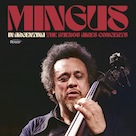

Charles Mingus: In Argentina: The Buenos Aires Concerts
Resonance Records
For many a reason, Charles Mingus's In Argentina: The Buenos Aires Concerts is an indispensable addition to his catalogue. Dating from June 1977, the recording is not only a document of the bassist's late career—the shows at at the Teatro Coliseo and the Teatro SHA (Sociedad Hebraica Argentina) occurred six months before Mingus's ALS (Lou Gehrig's disease) diagnosis and a year-and-a-half before his January 1979 passing—but also an incendiary account of his little-documented late-‘70s working quintet. Available in triple-LP and double-CD formats, the release features the legend and his longtime drummer-of-choice Dannie Richmond with trumpeter Jack Walrath, tenor saxophonist Ricky Ford, and pianist Robert Neloms, the playing raucous and fiery throughout. It might not be the greatest band Mingus ever helmed, but it is a powerful and seriously swinging one, and having it captured for posterity is welcome indeed.
Par for the Resonance course, the imprint's second Mingus release—the first 2022's The Lost Album from Ronnie Scott's—comes with commentaries from the label's Zev Feldman, Mingus biographer Brian Priestley, Argentinean writer Claudio Parisi, and revealing new interviews with Walrath and Ford. Such texts provide illuminating context and help the listener imagine being at the centre of the storm and witnessing two dates from the quintet's South American tour. It's fascinating to read Walrath's and Ford's candid texts (from interviews conducted in November and December 2024, respectively). Among other things, the trumpeter recounts how he hooked up with Mingus and his not always easy times playing with him, while Ford details his own first encounters with the bassist and vivid memories of the 1977 tour. Their Mingus portraits bring the cantankerous legend to life, as well as his attitude as a bandleader: Walrath, for instance, recalls Mingus “wanted something different” every night they played, while Ford, who joined Mingus after a stint with Mercer Ellington, states, “When you played with him, you were walking on eggshells.” Photos provide additional context, the quintet a striking outfit with Richmond looking debonair and a cool Ford primed for a Miami Vice cameo.
Things get underway with a brisk run-through of Mingus's Lester Young tribute "Goodbye Pork Pie Hat,” the trumpeter delivering a florid solo, the band swinging tightly behind him, Neloms taking a bluesy turn, and Ford and Mingus waxing reflectively. The impression forms early on of a limber and flexible unit that's attending closely to what's happening in the moment and responding in kind. Perpetuating the warm vibe of the opener and originally inspired by Duke's death in 1974, the ballad "Duke Ellington's Sound of Love” showcases Ford's and Walrath's chops and the rhythm section's turn-on-a-dime elasticity. Neloms, to his credit, largely eschews aping Ellington to instead impose his own stamp on the performance. The gutbucket (and tad Monk-ish) workout “Noddin' Ya Head Blues” exudes the relaxed intimacy of a Sunday afternoon rehearsal; with Ford and a sometimes muted Walrath leading the charge, "Three or Four Shades of Blue” roars with infectious swing and drive. In addition to that Ellington nod, Mingus nods to Charlie Parker in a brief, high-velocity treatment of “Koko/Cherokee” and then pays tribute to Ellington's long-time baritone saxophonist (who also died in '74) with a sultry and percolating cover of Sy Johnson's "For Harry Carney.”
Exhortations from the bandstand occur throughout, with Mingus egging on his band members and vocalizing on a couple of numbers too. During the Latin-infused odyssey "Cumbia and Jazz Fusion,” he and Richmond riff on the nursery-rhyme song “Mama's Little Baby Likes Shortnin' Bread,” and in "Fables of Faubus” we hear the drummer verbally responding to Mingus's challenge to “Name me someone who's ridiculous.” Not unusual for a live concert, the band stretches out for takes that often check in at ten minutes at a time and in the case of "Cumbia and Jazz Fusion” twenty-two. As long as it is, it's never less than compelling when it follows its declamatory opening vamp with the bite of its nursery-rhyme episode and breezy passages that are quintessential Mingus. After that epic, he sets his bass aside for the first of two brief solo piano performances.
The Teatro SHA set's the shorter of the two, but it's still long enough to include an eighteen-minute (incomplete) performance of "Sue's Changes” and an eleven-minute one of "Fables of Faubus.” Regularly alternating between accelerating and decelerating sections, the episodic former's marked by an extended Ford cadenza that sees him move from barrelhouse moments to “crying” and wailing. The latter's Mingus to the core, from its lyrical swinging statements to its vicious verbal call-outs and blazing solos. In both sets, the playing's raw but not sloppy, and the sound quality's generally good too, with clarity generally winning out over muddiness. In keeping with Walrath's comment that when Ford came into the band “he was full of his oats,” the saxophonist's playing is cocky and assured, while the trumpeter's registers no less forcefully (witness his toreador-like attack in "For Harry Carney”). Richmond's his usual inventive self, and Mingus and Neloms are rock solid throughout. As a document of where the bassist stood in 1977 and the calibre of his playing, the release is invaluable, and also shows how strong his playing still was during this late stage in his life.April 2025